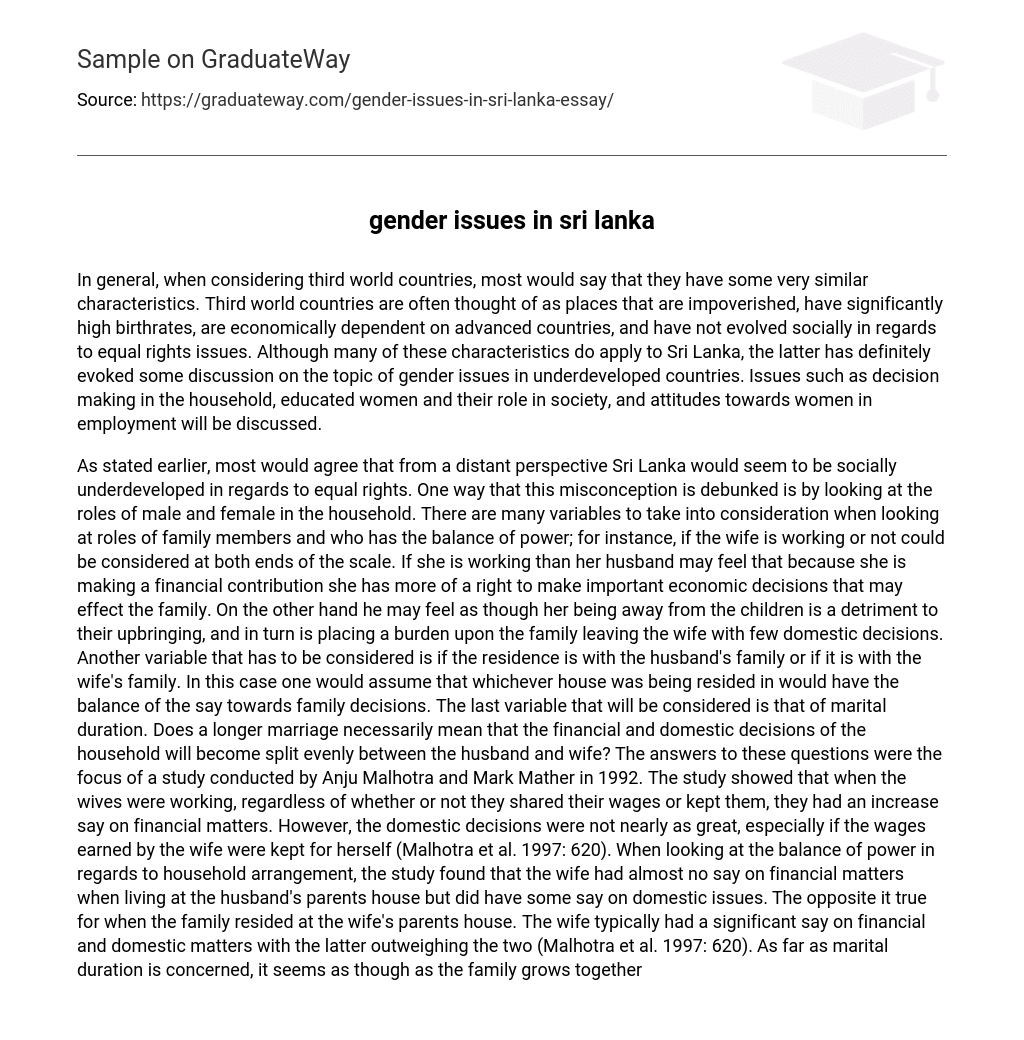Typically, third world nations are commonly associated with shared traits. These nations frequently experience poverty, high birth rates, dependence on developed countries for economic aid, and limited advancements in achieving social equality. Nonetheless, Sri Lanka has initiated conversations regarding gender concerns in less-developed nations. Such discussions encompass matters like household decision-making, the societal role of educated women, and attitudes towards women in professional settings.
The misconception of Sri Lanka’s social underdevelopment in terms of equal rights is disproven by analyzing the roles of men and women in households. Several factors, including the wife’s employment status and the location of residence, contribute to power dynamics within families. If the wife works, her financial contribution may give her more authority in making economic decisions that impact the family. However, her absence from their children’s lives could limit her involvement in domestic decision-making, posing a burden on her. Furthermore, whether they live with the husband’s or wife’s family influences the family’s decision-making power. The duration of marriage is also a factor to consider regarding an equal split between spouses in financial and domestic decision-making. A study conducted by Anju Malhotra and Mark Mather in 1992 explores these questions. The study found that employed wives, regardless of whether they shared or kept their wages, had greater influence over financial matters but not as significant influence over domestic decisions if they kept their earnings separate. Additionally, living arrangements impacted the balance of power; when residing at the husband’s parents’ house, wives had limited say on financial matters but some influence on domestic issues.In contrast, the dynamics were different when residing at the wife’s parents’ house. In such cases, the wife usually held considerable influence over financial and domestic matters, with the latter carrying more significance. Additionally, as the length of marriage grew, there seemed to be a shift in roles, with husbands becoming more involved in household affairs while wives assumed some responsibility for financial choices. These results imply that individuals in Sri Lanka resemble those in western societies regarding decision-making within households.
In developing countries, education is often not considered a viable option for underprivileged individuals. Unfortunately, this is the reality in many third world nations. However, Sri Lanka seems to be making advancements in this area. In the early 1980s, there was a significant gender disparity among scholars in Sri Lanka. Women accounted for slightly over 40% of those holding university degrees and slightly over 25% of those with post-graduate degrees (Ahooja-Patel K. 1979: 217). The situation was particularly concerning as women tended to concentrate their studies in fine arts or education rather than pursuing fields like business or engineering. Despite these worrisome statistics, Sri Lanka has implemented programs aimed at promoting female education and reducing gender inequalities. By the 1990s, the gap in literacy rates between genders had decreased to only a 5% difference, indicating progress (Malhotra et al. 1997:602). Many believe that as Sri Lanka becomes more westernized, women will gain more independence and contribute to creating a more equal society.
Despite efforts to improve the socioeconomic status of women, women in the workforce in western society face various barriers. In Sri Lanka, due to its struggling economy, employers may have legitimate concerns that could impact their business profitability. Generally, men are preferred over women as employees in Sri Lanka. Some employers express concerns about potential disruptions caused by maternity leave, which could disrupt workflow and potentially cause conflicts. There are also concerns about the financial burden of providing appropriate facilities for women. The focus of discussions often revolves around the Maternity Amendment Act of 1978, which grants women workers six weeks of paid maternity leave and allows for nursing breaks or shorter breaks if a daycare center is available (Ahooja-Patel K. 1979:219). According to the law, termination solely based on pregnancy is prohibited. However, many women in Sri Lanka still lack the required qualifications for available jobs, despite progress being made to address this issue. The persistence of the education and training gender gap in Sri Lanka has been a longstanding issue that indicates it will continue until reduced.
While Sri Lanka has made notable advancements in terms of gender equality in kinship and education, women still encounter obstacles concerning their economic status. Although there is acknowledgment of women’s role in the workforce, financial limitations hinder their complete involvement. Consequently, prevailing attitudes in Sri Lanka prioritize survival and persistently marginalize and suppress women.
1. Ahooja-Patel, Krishna. (1995). Employment of Women in Sri Lanka: the Situation in Colombo. p. 213-233.
2. Baker, Victoria, J. 1998. A Sinhalese Village in Sri Lanka: Coping with Uncertainty.
3. Cisneros, Susana, P. 1995. Supporting Women in the Informal Sector: A Peruvian Experience. p. 159-186.
4. Malhotra, Anju., M. Mather. 1997. The impact of schooling and work on the empowerment of women in developing countries: Gender and domestic decision-making in Sri Lanka. p. 599-627.
Perera, Lakshmi. 1995. Women in Micro- and Small-Scale Enterprise Development in Sri Lanka. p. 101-116.





